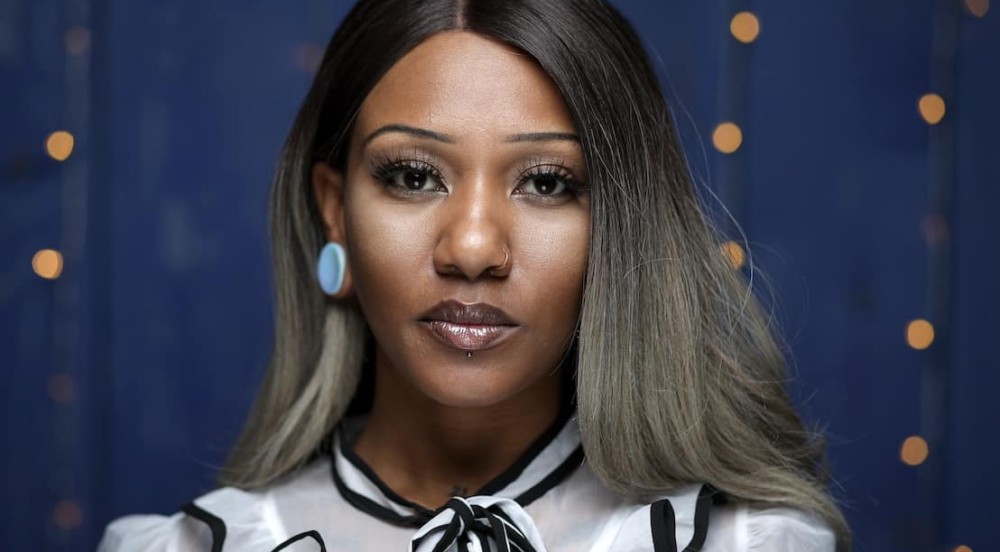Back in 2015, A’Ziah “Zola” King got Twitter and, ultimately, Hollywood’s attention when she shared a wild “road trip” she took to Florida to dance, or strip rather, that turned into something way more harrowing. That Twitter thread is now the movie Zola, directed by Janicza Bravo, who is among the growing ranks of Hollywood’s Black woman directors. Bravo penned the script with playwright Jeremy O. Harris, best known for his controversial Slave Play on Broadway. Taylour Paige, who played Ma’ Rainey’s girlfriend in the Netflix adaptation of Ma’ Rainey’s Black Bottom and is beloved by her fans as Ahsha Hayes in the VH1 series Hit the Floor, stars, alongside Riley Keough (who is Elvis Presley’s granddaughter), and her Ma’ Rainey’s Black Bottom co-star Colman Domingo. The real star throughout the process, however, is Zola herself.
A young Black woman now in her mid-20s who proudly uses her new celebrity to advocate for Black women sex workers and Black women in general by being who she is doesn’t usually fit Hollywood’s preferred script. And Zola knows it. Speaking with EBONY, Zola shared that one of the reasons her story matters is because “it gives just a different voice or a more accurate representation of Black women and Black sex workers, and just that entire realm of existence. I think it's something that isn't always represented correctly, or as accurately, because I think that [the people whose story it is] aren't always in the room. [This story] is an example of a sex work story being told by a sex worker; it's an experience of a Black woman being told by a Black woman, and that speaks volumes.”
When Zola’s journey to screen began roughly six years ago, the actor James Franco was set to direct—but in a real-life twist that could fill a plotline of a film itself—he was hit with #MeToo allegations. There was also worry about releasing a sexually-charged film such as Zola in such an intense climate. Eventually Bravo won the job, and Zola couldn’t be more elated.
“In the beginning, the energy was a bit different. The understanding wasn't what it became. There was almost a language barrier there,” she said of working with the original team for the film.
“I think it was easier to be involved with someone who comes from your world and speaks your language and understands your stance in the world. Even if it's not necessarily their experience, it's still one that they can grasp and accurately relate to and help you portray,” she explained. “And, that meant everything to me. I think that's really what saves the day.”
In the film, Zola takes a trip to Florida with Stefani (Keough), a white girl she meets while waitressing, with whom she becomes fast friends, Stefani’s boyfriend Derrek (Nicholaus Braun) and her “roommate” X (Domingo), with the promise of earning $5,000 in their strip clubs. Things quickly go left, and Zola finds herself in a web of prostitution and potentially deadly harm.
The real-life Zola is pleased with Taylour’s portrayal of her. The two, she shared, have become especially close. The actress, who was attached to the project prior to Bravo taking over the film, reached out to Zola after the film’s rewrite, which both agreed was better, for Zola’s blessing to pursue. “At that point, we just got super close. Like hour-long conversations. We'd hang out. We talked about everything. Our relationship, and our chemistry, has always been very personal. It was never about the film, or work, or any of that,” she explained. “We didn't talk about it. It wasn't like that interview thing or a coaching thing. None of that ever happened. We made an authentic friendship. And now, she's my sister.”
The quality Taylour captured that Zola cherishes the most is her confidence. “The fact that she can, even in film, be heard without saying anything. She can be heard. She can be felt. She can be seen. And she’s just there. That is me,” she explained.
Now that the film is out, Zola said that she is “most proud that we got to set the bar. This has never happened,” she said, referring to taking a Twitter thread all the way to the big screen. “No one really had anything to reference . . . . so I’m proud to be the first because I'm proud to set the standard. Now any writer, any creative that uses the Internet as a medium to share themselves or share their art or creative content, at least now, they get to compare it to something: and they can see what they're worth and what they deserve. And that it could and will pay off if that is their goal.
“So I'm proud to have really set the bar in that way. I'm proud that a Black female voice is being heard in that way, and is inspiring other Black female voices,” she continued. “I'm proud that I gave us that pat on the back and that stamp that we deserve. [We deserve] that agency over our voice.”













